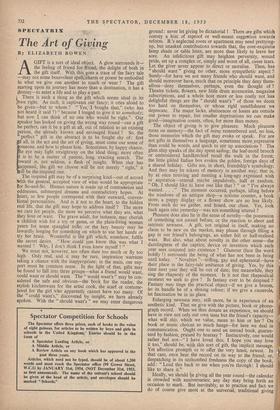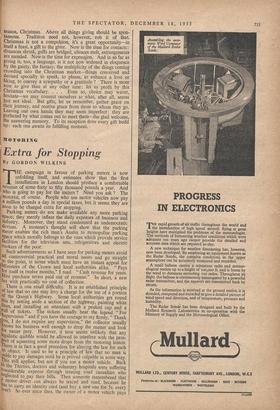SPECTATRIX
The Art of Giving
By ELIZABETH BOWEN GIFT is a sort of ideal object. A glow surrounds it— the feeling of friend for friend, the delight of both in the gift itself. With this goes a trace of the fairy tale —may not some benevolent spell, charm or power be embodied in what we give one another to touch or wear ? The gift starting upon its journey has more than a destination, it has a destiny—to enter a life and to play a part.
There is such a thing as the gift which seems ideal in its 'town right. As such, it captivates our fancy; it cries aloud to be given—but to whom ? " Yes, I bought that," (who has not heard it said ?) " because I longed to give it to somebody; but now I can think of no one who would be right." Our speaker has looked on giving the wrong way round—can a gift be perfect, can it be a gift at all, out of relation to an existing person, the already known and envisaged friend ? So, the " perfect " gift in the abstract is to be fought shy of : first pf all, in the act and the art of giving, must come our sense of omeone, and how to please him. Sometimes, by happy chance, he eye may light straightway on the ideal thing; more often t is to be a matter of patient, long, exacting search. The eward is, not seldom, a flash of insight. When that has appened, the gift we choose will be not merely " right," it ill be the inspired one. '
The inspired gift may be of a surprising kind—out of accord With the general, accepted view of what would be appropriate for So-and-So. Human nature is made up of contrarieties and oddnesses, submerged dreams and contradictory hopes. At heart, so few people correspond with their outward, conven- tional personalities. And is it not to the heart, to the hidden real life, that the gift may hope to address itself ? The more we care for people, the more we perceive what they are, what they love or want. The grave adult, for instance, may cherish a childish wish for a toy or game, or the plain-living woman yearn for some spangled trifle; or the lazy beauty may be inwardly longing for something on which to use her hands or try her brain. Wonderful is the gift which, somehow, fulfils the secret desire. " How could you know this was what I wanted ? Why, I don't think I even knew myself ! "
We must not, however, too often dare too much or fly too high. Only real, and it may be rare, inspiration warrants taking a chance with the inappropriate; in the main, our sup- port must be common sense. In the light of that, gifts may be found to fall into three groups—what a friend would want, could want or should want. The " would want's " may be con- sidered the safe and obvious—the book for the reader, the stylish kitchenware for the artist cook, the scarf or costume- jewel for the girl who apparently cannot have too many. Of the " could want's," discovered by insight, we have already spoken. With the " should want's ' we may enter dangerous ground : never let giving be dictatorial ! There are gifts which convey a hint of reproof or well-meant suggestion towards reform. B.'s neglected room or apartment may need prettying- up, but unasked contributions towards that, the over-exquisite lamp shade or table linen, are more than likely to leave her sore. An infelicitous gift may heighten perversity, wound pride, set up a complex or, simply and worst of all, cause tears. Let the giver never appear to direct or moralise. Then, has " should want " giving no other, more sympathetic aspect ? Surely—for have we not many friends who should want, and should moreover have, much that on principle they deny them- selves—deny themselves, perhaps, even the thought of ?
Theatre tickets, flowers, new little dress accessories, magazine subscriptions, and a whole host more or less costly not less delightful things are the " should want's " of those we deem too hard on themselves, or whose rigid unselfishness we deprecate. The major lacks, abstinences or losses are outside our power to repair, but smaller deprivations we can make good—imagination counts, often, for more than money.
The object of giving is to give pleasure. Much pleasure turns on memory—the fact of being remembered and, no less, those memories which the gift may evoke or speak. For are not gifts in themselves a language, sometimes more expressive than could be words, and quick to stir up associations ? The glass ship speaks of the day spent sailing; the leaf-motif brooch or embroidered handkerchief recall the walk in the forest; the little gilded Italian box evokes the golden, foreign days of a shared holiday. Gifts are, in short, friendship's symbology.
And they may be tokens of memory in another way; that is, by at once reviving and meeting a long-ago expressed wish or aspiration—uttered maybe impulsively, half at random.
" Oh, I should like to have one like that ! " or " I've always wanted. . . " The moment occurred, perhaps, idling before the windows of an antique shop—a notions counter, a book store, a puppy display or a flower show are no less likely. From such do we gather, and hoard, our clues. Yes, look back again into yesterday—was not something uttered ?
Pleasure does also lie in the sense of novelty—the possession of something not owned before, or the reaction to sheer and intrinsic newness. A gift, not original in itself, making no claim to be new on the market, may please through filling a gap in our friend's belongings, an either felt or half-realised want. But also, what about novelty in the other sense—the dazzlingness of the caprice, device or invention which each year sees conjured into existence ? Glamour (face the word boldly !) surrounds the being of what has not been in being until today. " Novelties "—trifling, gay and ephemeral—have their place in the fairy-tale ambience of giving. Yes, by this time next year they will be out of date; but meanwhile, they sing the rhapsody of the moment. Is it not that rhapsodical moment we seek to give ? Is fantasy ever to be despised ?
Fantasy may tinge the practical object—if we give a broom, let its handle be of a shining colour; if we give a casserole, let fascination be in its glaze.
Enlarging newness may, still, more, be in experience of an aesthetic kind. That we give with the picture, book or phono- graph record. When we thus donate an experience, we should have in view not only our own taste but the friend's capacity— what will this, which we value, mean to him or her ? On book or music choices so much hangs—for here we deal in communication. Ought one to send an unread book, guaran- teed by fashion, praised by hearsay ? Instinctively, one would rather feel not—" I have loved this; I hope you may love it too," should be, with this sort of gift, the implicit message. Yet affection prompts us to offer the very latest, newest. In that case, once hear the record on its way to the friend; or, despatching in its unthumbed freshness the copy of the book, add: " Lend this back to me when you're through: I should like to share it."
Ideally, we should be giving all the year round—the calendar is crowded with anniversaries; any day may bring forth an occasion to mark. But inevitably, as to practice and fact we do of course give most at the universal, traditional giving season, Christmas. Above all things giving should be spon- taneous. Tradition need not, however, rob it of that. Christmas is not a compulsion, it's a great opportunity—in itself a feast, a gift to the giver. Now is the time for contacts: distances shrink, gulfs are bridged, silences melt, estrangements are mended. Now-is the time for expression. And in so far as giving is, too, a language, is it not now widened in eloquence by the gaiety, the fantasy, the multiplicity of the things coming crowding into the Christmas market—things conceived and devised specially to speak, to please, to enhance a love or liking, to convey a sympathy or a gratitude ? There is more now to give than at any other time: let us profit by this Christmas vocabulary. . . . Even so, choice may waver, hesitate—we may commit ourselves to what, after all, seems just not ideal. But gifts, let us remember, gather grace on their journey, and receive grace from those to whom they go. Leaving our own hands they may seem imperfect: they are Perfected by what comes out to meet them—the glad welcome, the answering memory. To its reception does every gift build Lip : each one awaits its fulfilling moment.











































 Previous page
Previous page